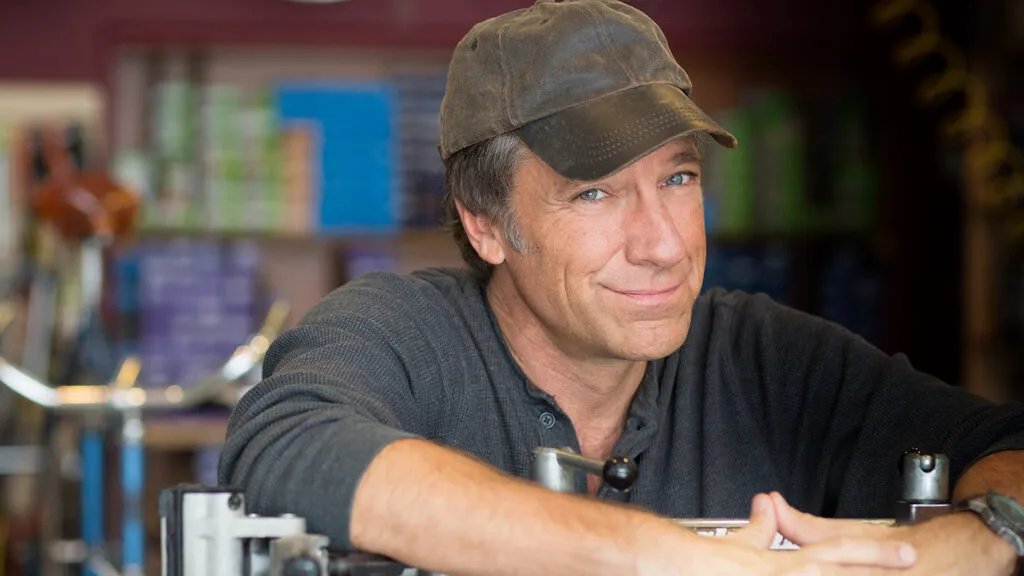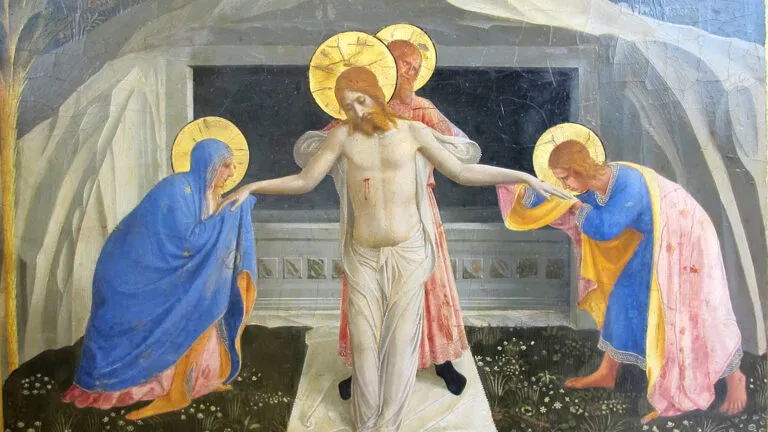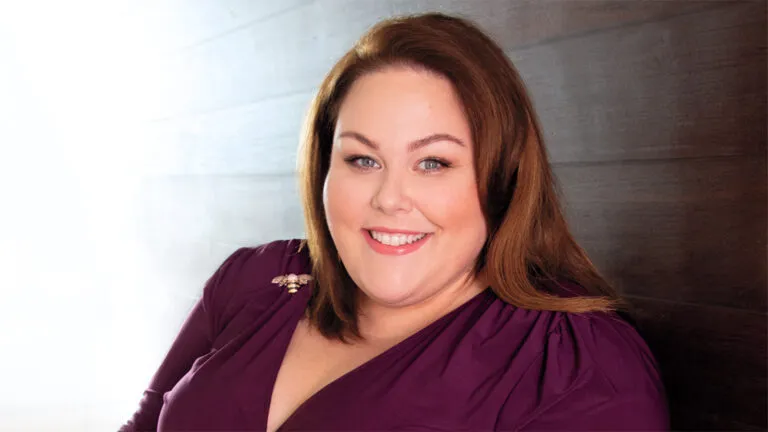Never in my wildest dreams did I think I’d make a living hosting and narrating TV shows. My plan was to follow in the footsteps of my grandfather, a man who worked with his hands, not his voice. A man who avoided the spotlight.
I grew up outside Baltimore, Maryland. We were just a few miles from the city, but it felt like a whole different world. Our family’s land bordered 60 acres of woods, so there was nobody else around. We lived next to my grandparents in an old farmhouse on eight acres with a barn, horses, a bridge and a babbling brook. Everything I needed for an idyllic boyhood.
My grandfather Carl Knobel—I called him Pop—left school after eighth grade to go to work. He was a master electrician by trade but he could do pretty much anything. Build a house without a blueprint. Dig a well. Install a furnace. I once saw him take apart a broken watch and put all the tiny pieces back together so that it ran perfectly again. I never once saw him read the instructions to anything. He just knew how stuff worked.
Pop had a huge hand in building an addition to our church, the wing where my Sunday school classes were held, my Boy Scout troop met and the congregation had potlucks and Bible studies. Not that he ever talked about it. Pop was a humble guy, a man of few words.
Dad was the one who showed me the plaque at church with my grandfather’s name on it. “That’s to honor him for all the work he did,” Dad said proudly. “Who else do you know with a plaque?” Dad was a public-school teacher but on weekends, he and Pop tackled one project after another.
I tagged along, trying to help out. Mostly, I just slowed things down. We used a woodstove, and on cold winter mornings we’d go out on the Massey Ferguson tractor in search of firewood. Mom would hand us a lunch box with a large thermos of coffee. “Try not to kill yourselves,” she said. “Dinner’s at six.”
We drove the tractor through the lower pasture into the woods. First we had to find the right tree. “Hardwood puts up a fight but it burns the best,” Dad said. Then the bigger challenge: taking the tree down properly so nobody got hurt and it landed exactly where you wanted.
How to make the notch in the trunk, where to put the pulleys and winches—regardless of the challenge, Pop had it all figured out. I remember one Saturday when I was 12 and the toilet in our house backed up in a rather spectacular fashion. The problem went well beyond a plunger. “Don’t worry,” Dad said. “Pop’s on his way over.”
We helped Pop dig a trench that led to the septic tank. Soon the lawn was covered with mounds of dirt and pieces of old pipe. Pop laid down new pipes and fittings and sealed them together. By the end of the day, the trench was filled in, the lawn was neat again and the toilet was back to normal. I had blisters and a sunburn. I didn’t smell good. Still, it was one of my favorite days ever.
To me, Pop was a magician, and his talents a great mystery. As his would-be apprentice, I mimicked his every move. I took the shop class offered in school, and applied myself. But the bookshelf I made turned out lopsided, the metal box I welded didn’t close tightly. My grandfather’s “mechanical gene” seemed to have skipped me, and my shortcomings made me grow insecure and resentful.
One Saturday I was helping Dad and Pop build a patio on our house. I can’t remember what I messed up that day—probably didn’t get the cement mixed right or the bricks laid in straight, but it felt like the final confirmation that I could never be like Pop.
I just didn’t have it, that gift he had for fixing things. I was not the would-be apprentice. I was the apprentice who would never be the master of any trade. I put down my tools, flopped on the ground and let out a long sigh. Pop stopped what he was doing and sat down beside me, waiting for me to stop feeling sorry for myself.
“I can’t do anything right,” I said ruefully.
“Sure you can, Mike.”
“Not like you, Pop. You could build a whole city if you wanted. I can’t even mix the cement.”
Pop thought for a moment before he spoke. “God gave me a toolbox, Mike. He gave you one too. But he didn’t give us the same one. You understand?”
I shrugged. He was just trying to make me feel better. I didn’t have a toolbox, and if I did, I doubted it contained anything worthwhile. Good thing other people knew better. Like my mom, who urged me to sign up for the high school choir. And Mr. Fred King, the new music teacher and choir director, who saw some potential in me and pushed me to develop my voice.
Soon, I was singing solos, then trying out for the school musical. I got the lead. Something clicked. Standing onstage, singing, performing, it just felt right. Over the years, I discovered I had other tools. For my Eagle Scout service project, I read aloud to students at the state school for the blind. I formed a barbershop quartet with some friends from choir, and with Mr. King’s help, we won several competitions.
I majored in communications in college, and studied acting and music. I won the debate competition. I auditioned for the Baltimore Opera—I figured it was a good way to meet girls—and sang professionally for several years. In the early 1990s I landed my first television gig: selling stuff on QVC, the home shopping channel. From there I got other work on air, hosting shows for local stations, then for TBS, FX, the History Channel, PBS. I approached my work like a tradesman, freelancing wherever the jobs took me.
On visits home to Baltimore, I’d play Pop videos of myself from this or that show, and he got a kick out of it. My quiet, ingenious grandfather— a man who would rather listen than speak—and me, his grandson who got paid to smile and talk. Amazing.
I was living in San Francisco, hosting a show on the local CBS station, when the toilet in my apartment backed up once again. (It’s a recurring theme in my life.) Pop wasn’t next door to help, so I found a plumber in the Yellow Pages.
“Think you can fix it while I’m at work?” I asked. “No problem,” he said. “Just leave a key under the mat and a check on the counter.” When I got home that night, the mess was gone and the toilet was working just fine. It was as if the plumber hadn’t even been there. But something bothered me.
I thought of Pop and the day he’d fixed our plumbing all those years ago. I thought of all the hard work he did on our house, our church, and hundreds of homes and businesses in our community. I remembered how badly I had wanted to be a part of all that, and how I had yearned for the ability to do what he could do.
I didn’t even know the name of the plumber who fixed my toilet. How could I be so disconnected from the kind of tradesman I had once dreamed of becoming? I considered a world without men like Pop. What would civilization look like without them? If a TV host calls in sick, life goes on. But if our tradesmen don’t report for work, things fall apart. Literally.
Okay, Mike, I thought. You found your toolbox. What are you doing with it? More game shows? Talk shows? What about a show for men like Pop? What about a show that honors hard work and the people who do it?
The next day, I pitched a new show to my station manager called Somebody’s Gotta Do It—short profiles of people who do the tough jobs. Rather than act like a typical host, though, I would assume the role of an apprentice, and let the worker call the shots.
It was a radical idea, but the manager gave me the go-ahead. I found a dairy farmer who specialized in artificially inseminating cows. My crew and I spent a day filming this man at work, showing what a hard, dirty—and necessary— job it was. That profile of the dairy farmer turned out to be the most popular segment the station had aired in years. We got tons of calls and e-mails, and invitations to film in all sorts of other interesting places.
Best of all, I got a thumbs-up from Pop. He was in his nineties and not getting around too well, but he was excited to see each new segment. “Good for you, Mike,” he said. “I think you’re on to something!” I did more of those profiles, which eventually led to the show I’m best known for, Discovery Channel’s Dirty Jobs.
In the next eight years, I would travel to every state and work every conceivable dirty job: salt miner, fish gutter, septic-tank technician, ostrich farmer, underwater lumberjack, worm-poop rancher—you name it. I can’t tell you that I did those jobs well. In fact, I was a disaster, as most apprentices are their first day on the job. But I didn’t care anymore. Because my incompetence was now illuminating the expertise of the skilled workers I profiled.
All I had to do was humble myself, share my own shortcomings with millions of viewers, and shine the spotlight on the very people I had always admired the most. Pop died just before Dirty Jobs premiered, but really, he had seen the first episode 40 years earlier. He knew it was there all along, buried in a toolbox I never knew I had. The one he told me about back when I was his apprentice. The best job I’ve ever had.
For more inspiring stories, subscribe to Guideposts magazine.





